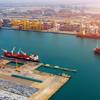The new report “The Drewry Annual LNG Shipping Market Review and Forecast” finds one sector of shipping with a bright future.
The last thirty months has seen a massive surge in interest in the previously conservative LNG business with
unprecedented levels of ordering activity for new vessels, much increased interest in new supply projects and
new/expanded, terminals.
With a growing fleet and more trading opportunities, the traditional structure of shipping could gradually be
broken down to be replaced by more flexible arrangements, with more spot and short term contracts,
encouraging speculative ventures and new entrants.
New technologies are helping to bring costs down and make previously uneconomic projects viable. In ship
design new propulsion systems aim to replace the traditional steam turbine engines with smaller more
efficient units that will not only reduce fuel costs bit will also increase cargo carrying capacity. The first
LNG FPSO is coming closer and closer and promises not only to reduce costs but open up whole new areas
for LNG export. Several new ships have been ordered with on board regasification facilities that will open up
many new areas to the possibility of LNG imports and help overcome environmental and NIMBY objections
to new LNG receiving terminals (especially in North America).
In LNG shipbuilding South Korea has clearly stolen a march on their traditional Japanese and European rivals
in the recent new orders boom but they may be about to face a low-cost challenge with China poised to join
the ranks of LNG shipbuilders.
China also provides a huge fresh new market for LNG and 2002 has seen the signing of the first two firm
contracts to supply the country with LNG (Guangdong from the NW Shelf (2006) and Fujian from Tangguh
(2007)). The potential in China seems to be on a far firmer footing than the previous predicted mega market
of India.
But it not just new markets that excite! The first ever LNG importer – the UK – is set to return as an LNG
importer in 2006, after a long absence, with a huge contract with Qatar. Elsewhere in Europe Spain continues
to rapidly expand LNG imports and smaller countries such as Greece and Portugal are joining the LNG
importing club.
Across the Atlantic the USA has been the focus of much of the recent boom in LNG. The natural gas price
spike in the winter of 2000/01, that attracted in record level of LNG imports from around the world, led to the
announcement of a host of new LNG receiving terminal projects in North America. Then September 11th
bought a temporary halt to all imports; whilst the collapse of Enron disrupted several LNG projects. However
since April 2002 import levels have been rising again and spot cargoes have resumed.
September 11th also brought a reminder about safety standards and put the LNG industry under the spotlight.
However, this just served to remind the wider shipping and energy industries of the excellent safety record the
LNG business has enjoyed throughout it’s history.
In an era when most other sectors of the shipping industry are suffering LNG shipping is enjoying an
unprecedented boom. Orders for ships have flooded in as the industry looks forward to trade widely
predicted to grow at between 7-8% per annum for the next decade.
Ship demand is likely to grow even faster as long-haul movements from the Middle East and other remote
areas, coupled with increased spot and short term trading fuels the demand for more shipping capacity.
Already a lot of orders have been placed for ships to service this demand with the current Orderbook seeing
the fleet expand to 193 vessels by 2006. This may create some short-term problems mid-decade with new
shipping capacity coming on to the market faster than LNG liquefaction or regasification capacity. However by 2010 approximately 250 vessels will be needed to accommodate the forecast trade and another 50-60 vessels will have to be ordered in the next few years.
Featured videos

Tracking Foreign Vessels Working in the U.S. Jones Act Market

Inside the Electrified Truckable Tug

Inmarsat Enhances Service to Drive Digitalization
Subscribe for
Maritime Reporter E-News
Maritime Reporter E-News is the maritime industry's largest circulation and most authoritative ENews Service, delivered to your Email five times per week









